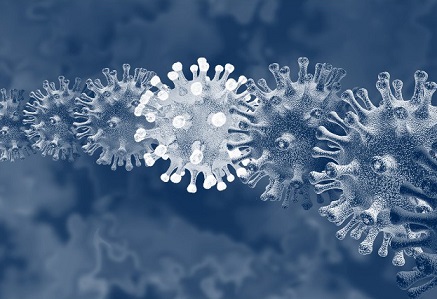ORF6 Protein Inhibits Nuclear Export, Blocking Cell Defense Mechanisms in COVID-19
Nikhil Prasad Fact checked by:Thailand Medical News Team Nov 08, 2024 1 year, 3 months, 2 weeks, 3 days, 2 hours, 34 minutes ago
Medical News: The SARS-CoV-2 virus, responsible for COVID-19, has been under intense study to understand its effects on the human immune system. Among the viral proteins, ORF6 stands out for its ability to disrupt essential cell functions. This
Medical News report highlights findings from researchers at Kyoto University-Japan, revealing how ORF6 blocks the export of specific RNA types, which plays a crucial role in cellular gene expression and immune response.
 ORF6 Protein Inhibits Nuclear Export, Blocking Cell Defense Mechanisms in COVID-19
Key Findings: ORF6 Disrupts RNA Export
ORF6 Protein Inhibits Nuclear Export, Blocking Cell Defense Mechanisms in COVID-19
Key Findings: ORF6 Disrupts RNA Export
The study focused on the ORF6 protein’s impact on RNA export - a process essential for gene expression within cells. ORF6’s primary target is a protein complex called RAE1-NUP98. This complex assists in transporting various RNAs from the cell nucleus to the cytoplasm, where they can direct protein synthesis. In simpler terms, RNA export is like sending important messages (RNA) from the office (nucleus) to the production floor (cytoplasm) for action. By interfering with RAE1-NUP98, ORF6 essentially blocks the messages from getting through, causing significant disruptions in cellular function.
The study revealed that ORF6 not only blocked the export of regular mRNA but also inhibited U snRNA - small nuclear RNAs involved in splicing, a process critical to forming functional messenger RNAs. These effects are more than just incidental; they reflect a deliberate viral strategy to undermine the cell's normal defenses and make it more vulnerable to viral takeover.
Experimental Setup and Methods
The researchers used an innovative method involving Xenopus oocytes, or frog eggs, to model the effects of ORF6 on RNA export. The advantage of using Xenopus eggs is that they allow clear visualization of RNA export processes separated from transcription (RNA production). After injecting ORF6 into these oocytes, researchers observed notable reductions in the export of mRNA and U snRNA. A decrease in RNA export indicates that ORF6 is likely a significant player in SARS-CoV-2’s strategy to impair host cell function.
In addition to these live experiments, the research team conducted in vitro tests to closely examine ORF6’s impact on the interaction between RAE1 and RNA export receptors. Using binding assays with purified proteins, they confirmed that ORF6 disrupts this interaction and reduces RAE1’s RNA-binding capability, further solidifying its role in blocking RNA export.
How ORF6 Affects the Immune System
Blocking RNA export has cascading effects on the immune response. Interferon (IFN), a protein central to the immune response, relies on mRNA export to signal for defense mechanisms within the cell. With the interference from ORF6, IFN production and signaling are severely hampered. This suppression of interferon-stimulated genes means that infected cells are left without the necessary proteins to defend against the virus effectively.
Moreover, by blocking these exp
orts, ORF6 contributes to a broader inhibition of cellular gene expression, disrupting the cell’s ability to maintain other critical functions, like cell viability and immune signaling. Such widespread inhibition may explain some of the severe inflammatory and immune-related symptoms observed in COVID-19 patients.
Implications of ORF6 in COVID-19 Pathology
The ability of ORF6 to disrupt essential cellular functions and immune responses sheds light on the mechanisms that make SARS-CoV-2 so effective at evading immune detection. By blocking RNA export, ORF6 ensures that infected cells struggle to mount a defense, effectively turning off one of the first lines of immune response. Additionally, this inhibition might contribute to the immune system’s delayed or overly aggressive response, often seen in severe COVID-19 cases.
The findings from Kyoto University not only underscore ORF6’s role in SARS-CoV-2 pathology but also point to a potential therapeutic target. Drugs that could counteract ORF6’s inhibition of RNA export might restore the cell’s ability to produce necessary immune factors, potentially reducing the virus's ability to spread and damage tissue.
Potential for Therapeutic Intervention
Given the significance of RNA export in cell function and immunity, researchers are exploring options to mitigate ORF6’s disruptive effects. By restoring RNA export pathways, scientists aim to enhance the cell’s ability to produce interferon and other immune-stimulating proteins. Such interventions could reduce viral replication and improve patient outcomes.
Therapies that counteract ORF6 could work in combination with existing antiviral drugs to strengthen the immune system’s response. Although still in early stages, these insights into ORF6 may pave the way for developing drugs that prevent SARS-CoV-2 from hijacking cellular machinery.
Conclusion
The study findings illuminate the critical role of the SARS-CoV-2 ORF6 protein in undermining immune responses by blocking RNA export. This deliberate interference highlights SARS-CoV-2’s complex tactics for immune evasion and viral replication, painting a clearer picture of why COVID-19 can become so severe in certain cases. Targeting ORF6’s effects on RNA export may provide a promising path forward in developing treatments for COVID-19, especially in severe cases where immune suppression is a significant factor.
The study findings were published in the peer-reviewed journal: PLOS ONE.
https://journals.plos.org/plosone/article?id=10.1371/journal.pone.0312098
For the latest COVID-19 News, keep on logging to Thailand
Medical News.
Read Also:
https://www.thailandmedical.news/news/unveiling-the-intriguing-mechanism-of-sars-cov-2-s-most-toxic-accessory-protein-orf6-sheds-light-on-covid-19-pathogenesis
https://www.thailandmedical.news/news/interferon-lambda-can-be-used-an-antiviral-against-sars-cov-2-as-it-inhibits-orf6-protein
https://www.thailandmedical.news/news/covid-19-news-scientists-discover-new-strategy-to-inhibit-sars-cov-2-infection-by-exploiting-host-protein-prpf19-to-degrade-orf6-via-ubiquitination
https://www.thailandmedical.news/news/covid-19-news-study-shows-that-newer-sars-cov-2-omicron-sub-lineages-are-all-evolving-to-evade-innate-immunity-via-orf6-proteins
https://www.thailandmedical.news/news/covid-19-news-study-shows-that-sars-cov-2-orf6-plays-key-roles-in-interferon-antagonism-and-viral-pathogenesis
https://www.thailandmedical.news/news/study-finds-that-met58-and-di-acidic-motif-located-at-c-terminal-region-of-sars-cov-2-orf6-plays-a-crucial-role-in-its-structural-conformations
https://www.thailandmedical.news/news/sars-cov-2-accessory-proteins-orf6,-orf8,-orf9b,-orf9c-have-the-ability-to-trigger-inflammatory-and-profibrotic-processes-through-il11-signaling
https://www.thailandmedical.news/news/sars-cov-2-research-orf6-and-nsp13-proteins-cause-degradation-of-the-dna-damage-response-kinase-chk1-through-proteasome-and-autophagy
https://www.thailandmedical.news/news/covid-19-news-study-validates-that-sars-cov-2-accessory-proteins-orf6,-orf8,-orf9b-and-orf9c-involved-in-profibrotic-processes
https://www.thailandmedical.news/news/covid-19-latest-yet-another-way-sars-cov-2-evades-immune-response,-this-time-by-using-its-orf6-protein-to-hijack-the-nup98-pathway
